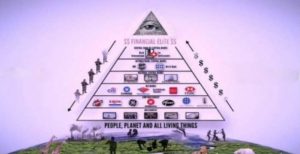Του καθηγητή Γιώργου Πιπερόπουλου
Ο Marc Roche δεν είναι «φρέσκος» στο διεθνές δημοσιογραφικό στερέωμα,
αλλά ένας έμπειρος δημοσιογράφος-αναλυτής. Ζει και εργάζεται στο
Λονδίνο και είναι ανταποκριτής της Γαλλικής Le Monde, της Βελγικής Le
Soir, και της Ελβετικής La Tribune de Genève,
Το πρόσφατο άρθρο του στην Le Monde είχε για τίτλο:
«EUROPEAN UNION – Our friends from Goldman Sachs…»
Και, όπως μπορεί εύκολα να διαπιστώσει κανείς, σπάει…
κόκκαλα!
Μεταφράζω παρακάτω μόνο την εισαγωγή στο άρθρο και παραθέτω το
link στην αγγλική γλώσσα:
«Οι Μario Monti, Lucas Papademos και Mario Draghi έχουν κάτι κοινό
μεταξύ τους: έχουν διατελέσει στελέχη στην ίδια Αμερικανική επενδυτική
τράπεζα. Αυτό δεν αποτελεί σύμπτωση, αλλά απόδειξη μιας στρατηγικής
άσκησης επιρροής που ίσως έχει φτάσει στα όριά της…»
http://www.presseurop.eu/en/content/article/1177241-our-friends-
goldman-sachs
Εύχομαι «καλή ανάγνωση και…ενημέρωση»
*******************************************************************
Mario Monti, Lucas Papademos and Mario Draghi have something in common:
they have all worked for the American investment bank. This is not a
coincidence, but evidence of a strategy to exert influence that has perhaps
already reached its limits.
Serious and competent, they weigh up the pros and cons and study all of the
documents before giving an opinion. They have a fondness for economics,
but these luminaries who enter into the temple only after a long and
meticulous recruitment process prefer to remain discreet. Collectively they
form an entity that is part pressure group, part fraternal association for
the collection of information, and part mutual aid network. They are the
craftsmen, masters and grandmasters whose mission is “to spread the truth
acquired in the lodge to the rest of the world.”
According to its detractors, the European network of influence woven by
American bank Goldman Sachs (GS) functions like a freemasonry. To diverse
degrees, the new European Central Bank President, Mario Draghi, the newly
designated Prime Minister of Italy, Mario Monti, and the freshly appointed
Greek Prime Minister Lucas Papademos are totemic figures in this carefully
constructed web.
Heavyweight members figure large in the euro crisis
Draghi was Goldman Sachs International’s vice-chairman for Europe between
2002 and 2005, a position that put him in charge of the the “companies and
sovereign” department, which shortly before his arrival, helped Greece to
disguise the real nature of its books with a swap on its sovereign debt.
Monti was an international adviser to Goldman Sachs from 2005 until his
nomination to lead the Italian government. According to the bank, his
mission was to provide advice “on European business and major public
policy initiatives worldwide”. As such, he was a “door opener” with a brief to
defend Goldman’s interest in the corridors of power in Europe.
The third man, Lucas Papademos, was the governor of the Greek central
bank from 1994 to 2002. In this capacity, he played a role that has yet to be
elucidated in the operation to mask debt on his country’s books, perpetrated
with assistance from Goldman Sachs. And perhaps more importantly, the
current chairman of Greece’s Public Debt Management Agency, Petros
Christodoulos, also worked as a trader for the bank in London.
Two other heavyweight members of Goldman’s European network have
also figured large in the euro crisis: Otmar Issing, a former member of
the Bundesbank board of directors and a one-time chief economist of the
European Central Bank, and Ireland’s Peter Sutherland, an administrator for
Goldman Sachs International, who played a behind the scenes role in the
Irish bailout.
Relay exclusive information to the bank’s trading rooms
How was this loyal network of intermediaries created? The US version of
this magic circle is composed of former highly placed executives of the bank
who effortlessly enter the highest level of the civil service.
In Europe, on the other hand, Goldman Sachs has worked to accumulate a
capital of relationships. But unlike its competitors, the bank has no interest
in retired diplomats, highly placed national and international civil servants,
or even former prime ministers and ministers of finance. Goldman’s priority
has been to target central bankers and former European commissioners.
Its main goal is to legally collect information on initiatives in the near future
and on the interest rates set by central banks. At the same time, Goldman
likes its agents to remain discreet. That is why its loyal subjects prefer not
to mention their filiation in interviews or in the course of official missions.
These well-connected former employees simply have to talk about this and
that secure in the knowledge that their prestige will inevitably be rewarded
with outspoken frankness on the part of those in powerful positions. Put
simply they are there to see “which way the wind is blowing,” and thereafter
to relay exclusive information to the bank’s trading rooms
Bid for global dominance
Now that it has a former director at the head of the ECB, a former
intermediary leading the Italian government, and another in charge in
Greece, the bank’s antagonists are eager to highlight the extraordinary
power of its network in in Frankfurt, Rome and Athens, which could prove
extremely useful in these turbulent times.
But looking beyond these details, the power of Goldman’s European
government before and during the financial ordeal of 2008 may well prove
to be an obstacle. The relationships maintained by experienced former
central bankers are less likely to be useful now that politicians are aware of
the unpopularity of finance professionals who are seen to be responsible for
the present crisis.
Where Goldman Sachs used to be able to exercise its talents, it now has to
contend with opposition from public authorities raising questions about a
series of scandals. A well stocked address book is no longer sufficient in a
complex and highly technical financial world, where a new generation of
industry leaders are less likely to be imbued with an unquestioning respect
for the establishment.
In their bid for global dominance, they no longer need to rely on high
finance crusaders in the Goldman mould, while the quest to protect
shareholder’s rights, demands for more transparency and active opposition
from the media, NGOs, and institutional investors continue to erode the
potency of “the network effect.”
Use Facebook to Comment on this Post










![Ο μύθος της γέφυρας του διαβόλου στον ποταμό Άρδα [εικόνες]](https://1.bp.blogspot.com/-1Txq8I9Z9IY/VISWhSOt2zI/AAAAAAAAZkc/miFmi3Nf2bU/s1600/1.jpg)






